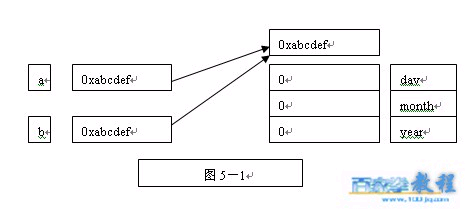
Basic type:
It goes without saying that the basic type is a number, a character or a Boolean value.
Reference type:
is an object type, what is the value? Its value is a reference to the memory space, which is the address. The memory pointed to holds a value or a set of values represented by the variable.
Example:
int a;
a=250; //When declaring variable a, the system allocates space to a.
The reference type is not. Only the reference space is allocated to the variable, and the data space is not allocated, because no one knows what the data is, integer, character? Let's look at an error example:
MyDate today;
today.day = 4; //An error occurred because the data space of the today object is not allocated.
Then how do we assign a value to it? After declaration, a reference type variable must open up data space through instantiation before the object pointed to by the variable can be accessed. For example:
MyDate today; //Allocate the variable to a space to save the reference
today = new MyDate(); //This sentence is a 2-step process, first execute new MyDate( ), open up a data space for the today variable, and then perform the assignment operation
//Assignment of reference variables
MyDate a, b; #a = new MyDate(); //Open up the data space of the MyDate object, and assign the first address of the space to a
b = a; //Write the address in the storage space of a to the storage of b In the space
As shown below

Reference type:
Except when a function passes a value, it is "pass by reference". Any time "=" is used to assign a value to an object variable, it is "pass by reference".
Value transfer:The transfer of basic types belongs to value transfer, just like C language, when Java’s basic data types (such as
int, char, double, etc.) are passed to the function body as entry parameters, the passed parameters become local variables inside the function body. This local variable is a copy of the input parameter. All functions
The internal operations of the number body are all operations on this copy. After the function execution is completed, this local variable has completed its mission, and it will not affect the variables used as input parameters. Parameter passing in this way is called "value
Pass"./*define a class*/class MyDate{
String Year;
String Month;
String Day;
String Date; public MyDate(){
Year = "1900";
Month ="01";
Day = "01";
Date = Year + "." + Month + "."+ Day;
} public String toString(){ return Date;
}
}public class ObjRef{
MyDate mydate1 = new MyDate();
MyDate mydate2 = mydate1;// = 使 mydate1和 mydate2将指向同一内存空间 //MyDate mydate2 = new MyDate();//从新new一个对象,则mydate1和mydate2是指向不同的内存空间的: //引用空/间和数据空间都不一样
public void changeObj(MyDate inObj){
inObj.Date = "2007.09.26";
}
public static void main(String[] args) {
ObjRef oRef = new ObjRef();
System.out.println("Before call changeObj() method: " + oRef.mydate1);
oRef.changeObj(oRef.mydate1);
System.out.println("After call changeObj() method: " + oRef.mydate1);
System.out.println("After call changeObj() method: " + oRef.mydate2);//验证“= mydate1和 mydate2将指向同一内存空间“这一结论
}
}
The above is the detailed content of Detailed comparison of basic type variables and reference type variables in Java. For more information, please follow other related articles on the PHP Chinese website!




